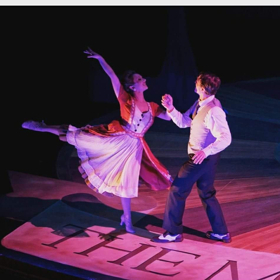BWW Blog: Why Ballet Essential Ballet Training for a Musical Theatre Student

It is a widely known fact that ballet is the hardest style of dance to train in, and requires the use of muscles that the average person would not even know existed. The isolation of different body parts to properly execute ballet combinations is extremely difficult to mentally understand, let alone physically do, evidently making it a very stressful art form. I was always very puzzled by ballet: by the terminology, why this body part goes here without letting this other body part move, how properly standing in fifth position is one of the hardest physical activities ever, and pretty much everything about it. I'm also one to call myself a failure if I don't do something correctly the first time, therefore in all my years of ballet class I was always very difficult to teach (sorry to every ballet teacher I've ever had for being such a brat!!). Despite ballet being a nearly impossible art form to perfect, it is the ground foundation of any style of dance and sculpts your body into its best form, essential for any performer of any facet. I did not fully understand why balancing in coupe front for a million and four counts during barre would help me do hitch kicks in "Seventy-Six Trombones" until this summer, when I actually did hitch kicks in "Seventy-Six Trombones". (See what I did there?!)
I was the dance captain for a production of "The Music Man" out in the Berkshire region of Massachusetts, and we were performing a "real Broadway schedule": eight shows a week with two-show days on Wednesdays and Saturdays. Pure adrenaline of doing this classic show with classic choreography was getting me through the rehearsal and tech process and our first week of shows. I hadn't been in class for a while, but I was still in decent shape to execute the dance numbers. It wasn't until the middle of week 2 of shows that my body started to feel fatigued. It took me forever to get out of bed in the morning and I was starting to feel lethargic onstage. I knew it wasn't because I wasn't passionate about what I was doing, and I was stretching before every show, but my stamina was decreasing and I needed to figure out why.
That next Wednesday I went to an open ballet class at Jacob's Pillow with a few of my castmates, and it was honestly the best thing I could have done. I knew I was going to be rusty since I hadn't consistently been in class that summer, but by the end of class I felt every muscle working the way it should have been, and with my body re-introduced to those muscles I was able to complete my two shows that day with plenty of energy. During the class I was applying corrections I had heard almost my entire dance career, but for some reason on this one day I fully understood why they were important because I knew my body needed it in order to finish the run of the show. I'm thankful it was ballet class improving my physical being and not physical therapy after a show-related injury, and it was a lightbulb moment in my training teaching to always be accepting and open minded in future ballet classes because in order to sustain eight shows a week, you need ballet.
The rest of the run I did a ballet barre before every show, and now whenever I take class outside of my university, nine times out of ten it is a ballet class. Ballet has not only made me a smarter dancer but it has improved my posture and taught me how to carry myself more confidently (which is a must for any actor-singer even if you are not a dancer). Even if you do not pursue dance as a career, training in ballet teaches one discipline, punctuality and determination to try something new, and in this career one needs to be fearless. So the next time you think about skipping ballet, you could be trading that missed class in for a physical therapy session for an injury you have down the road.
Comments
Videos


